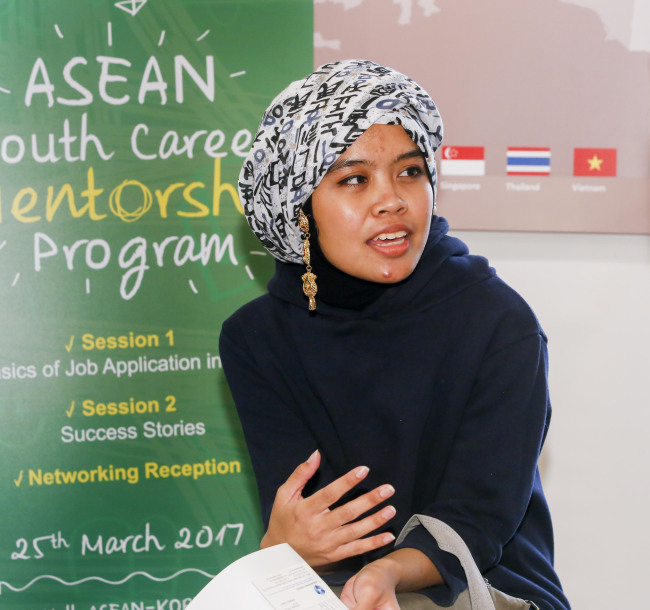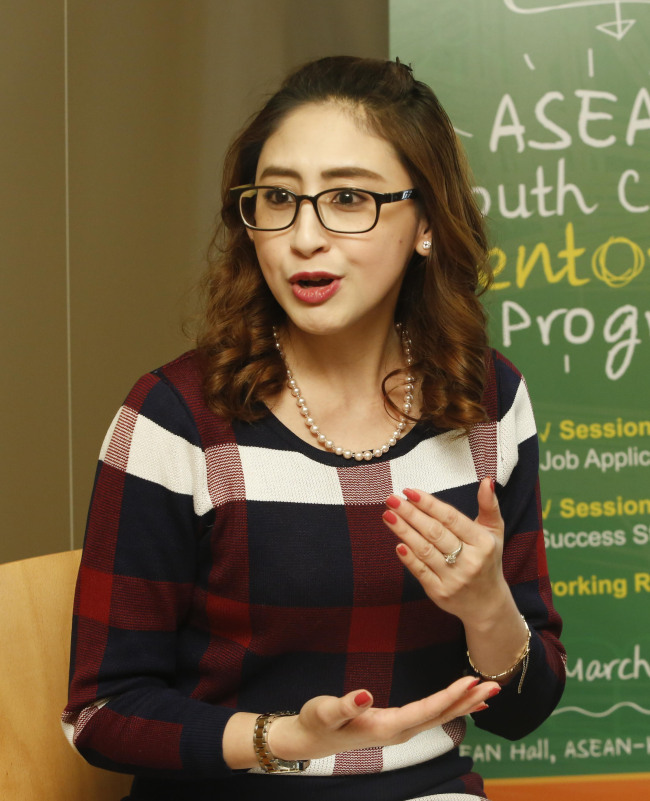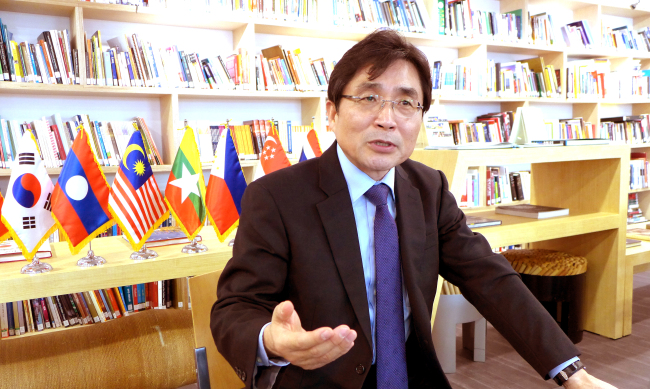Alfiana Raharjo dreams of teaching the Korean language to Southeast Asians vying for careers in Korea.
As an Indonesian studying at Ewha Womans University in Seoul, she has acquired an acumen of Korea, which she believes will prove instrumental in bridging the two countries.
Raharjo also wants to offer her perspectives on halal-oriented tourism here, as the country is belatedly beginning its charm offensive toward Muslim travelers from the Association of Southeast Asian Nations, as part of its diversification strategy.
 |
Alfiana Raharjo is an Indonesian student at Ewha Womans University in Seoul. (ASEAN-Korea Center) |
“Wearing a hijab, eating halal food and praying five times a day, I’ve encountered frequent problems in Korea,” Raharjo told The Korea Herald on March 25. “Indonesia, Malaysia, Brunei and other Muslim-dominant countries in ASEAN have great tourism potentials, but many of their travelers don’t choose Korea as an initial destination, preferring Turkey, Dubai and other halal-friendly countries instead.”
Raharjo was participating in a mentorship program for students and young people seeking employment in Korea, organized annually by the ASEAN-Korea Center in Seoul. The event comprises a lecture on job application processes and requirements -- with tips on writing cover letters and succeeding in interviews -- and a networking session for students and graduates who have been hired by Korean companies.
As advice to people looking for careers in ASEAN, Raharjo emphasized the importance of mastering the local language, noting “English proficiency is not enough.” English is not an official or second language across most ASEAN societies, with the exceptions of Singapore and Malaysia, Raharjo mentioned, adding in Indonesia it is the third most spoken language and first foreign language.
“Secondly, immerse yourself in the local culture,” Raharjo recommended, noting ASEAN is roughly divided into three cultural groupings: the Indo-China group of Cambodia, Myanmar, Thailand and Vietnam; the Malay-Austronesian group of Brunei, Indonesia, Malaysia, Singapore, southern Thailand and southern Philippines; and the Western-Austronesian group of East Timor and the Philippines.
 |
Marilyn Manalaysay, a Filipino who works at GS Engineering and Construction as a global human resources assistant manager in Korea, gives advice to job-seeking students from the Association of Southeast Asian Nations at a seminar organized by the ASEAN-Korea Center on March 25. (ASEAN-Korea Center) |
“Thirdly, do not act in a superior way as a Korean,” she urged, adding that Koreans often fail to mingle with other nationalities. Raharjo also dissuaded against brandishing a luxurious lifestyle or complaining about hot weather or traffic jams.
Noting that Korean people work hard, the Indonesian suggested the often ostentatiously gung-ho ethos may not be suitable in Southeast Asia, a region that celebrates pragmatic and down-to-earth lifestyles.
“One of my friends who worked at a Korean company in Indonesia told me he couldn’t understand why his boss kept him in the office after work hours, when he finished his job,” Raharjo recalled. “My friend said he ended up watching movies and playing computer games in his cubicle, instead of going home early to his family. He asked me why Koreans worked vaingloriously instead of working smart and productive.”
Marilyn Manalaysay, a Filipino who works at GS Engineering and Construction as a global human resources assistant manager in Korea, said some of her job-related challenges have included long office hours, juggling work and family, the high expectations of colleagues and feelings of alienation.
 |
Marilyn Manalaysay, a Filipino who works at GS Engineering and Construction as a global human resources assistant manager in Korea, gives advice to job-seeking students from the Association of Southeast Asian Nations at a seminar organized by the ASEAN-Korea Center on March 25. (ASEAN-Korea Center) |
“But after gaining my colleagues’ trust and confidence, I found it very rewarding to see them respect who I am and what I do,” Manalaysay said. “Through my commitment to and lasting relationships with my coworkers, they started listening to my ideas and suggestions and recognized my efforts.”
On how Korean companies can improve their culture and governance, she suggested the pool of employees can be more diversified with additional global talents, and the roles and responsibilities placed on foreign employees should stand equal to those of Koreans.
“ASEAN youths here play a key role in strengthening our bilateral relations,” said Kim Young-sun, secretary general of the ASEAN-Korea Center, adding those who studied and launched careers in Korea serve as vital links connecting the two regions.
“When they go back to their countries, they can apply the skills, knowledge, experience and networks they have developed to help the local economies move up the value chain.”
 |
Kim Young-sun, secretary general of the ASEAN-Korea Center, was the Korean ambassador to Indonesia from 2011 to 2014. (Joel Lee/The Korea Herald) |
According to 2016 statistics, there are 485,000 people from ASEAN living in Korea, out of which more than 17,000 are students enrolled in universities and 200,000 are workers in various sectors. Highlighting that ASEAN has become the new economic horizon for businesses, the former career diplomat argued the Southeast Asians, by tapping into their tacit knowledge, could assist Korean firms as they make inroads into local markets.
Kim -- the Korean ambassador to Indonesia from 2011 to 2014 -- also encouraged Koreans to seek employment and entrepreneurial opportunities in ASEAN, as Korea’s economy has been growing tepidly with prospects for new jobs on the decline.
“It is high time for Korean youths to consider ASEAN as a place to realize their dreams and potentials,” the secretary general said. “Employment and business opportunities there are growing on the back of rapid economic expansions, and various infrastructures are being developed.”
The rising number of Koreatowns in major cities in ASEAN means newcomers can easily find support for a softer landing on their new environment, he added.
By Joel Lee (
joel@heraldcorp.com)










![[Exclusive] Hyundai Mobis eyes closer ties with BYD](http://res.heraldm.com/phpwas/restmb_idxmake.php?idx=644&simg=/content/image/2024/11/25/20241125050044_0.jpg)
